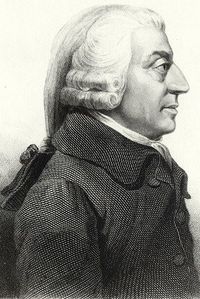
George Mason University professor of economics Daniel Klein has asked me to post this.
First, a little background. Dan noted a passage from Andy Smarick at our sister publication Law and Liberty. Smarick, a senior fellow at the Manhattan Institute, wrote, “Who Will Lead Us?” Law and Liberty, June 3, 2024.
Here’s the passage:
[O]ur Framers continuously noted the importance of virtue in the maintenance of a republic. George Washington wrote in his farewell address, “Virtue or morality is a necessary spring of popular government.” John Adams wrote, “The only foundation of a free Constitution is pure virtue” and “public virtue is the only foundation of republics.” Benjamin Rush argued, “Without virtue there can be no liberty.” Benjamin Franklin wrote, “Only a virtuous people are capable of freedom.” James Madison wrote, “To suppose that any form of government will secure liberty or happiness without any virtue in the people, is a chimerical idea.” And Samuel Adams argued, “He therefore is the truest friend of the liberty of his country who tries most to promote its virtue.”
Dan then commented, “May we include Adam Smith as an honorary founding father?” Dan pointed out that in The Theory of Moral Sentiments he wrote:
What institution of government could tend so much to promote the happiness of mankind as the general prevalence of wisdom and virtue? All government is but an imperfect remedy for the deficiency of these. Whatever beauty, therefore, can belong to civil government upon account of its utility, must in a far superior degree belong to these. On the contrary, what civil policy can be so ruinous and destructive as the vices of men? The fatal effects of bad government arise from nothing, but that it does not sufficiently guard against the mischiefs which human wickedness gives occasion to.
I agree with all that. I also want to point out, though, that markets often give a strong incentive for people to be virtuous. I wrote a whole chapter on this in my 2001 book, The Joy of Freedom: An Economist’s Odyssey.

READER COMMENTS
Craig
Jun 4 2024 at 9:35am
The defence is greater than opulence bit accepts the necessity of the Navigation Acts for purposes of national security which DoI complains about when refering to trade restrictions. So important? Yes honorary FF? No, sorry that goes too far.
David Henderson
Jun 4 2024 at 10:37am
Who is Dol?
Craig
Jun 4 2024 at 10:50am
Declaration of Independence.
Jon Murphy
Jun 4 2024 at 11:10am
It’s worth pointing out that Smith did think the Colonials had a legitimate beef about the Navigation Acts, which is why he does walk back some of his praise of it later in WN. Furthermore, as Douglas Irwin discusses in his book Clashing Over Commerce, the Founding Fathers also saw wisdom in the Navigation Acts and there was fierce debates in early Congress about implimenting a version of their own.
Daniel Klein
Jun 4 2024 at 11:38am
Yes, along the lines of what Jon says, the Navigation Acts have to be disaggregated. Smith wanted more goods to be “unenumerated”, as opposed to “enumerated,” which is to say, he wanted more goods to not be confined to British market, and that whole matter of enumerated vs. unenumerated is part of the Navigation Acts (as I understand it).
Furthermore, on the defence-before-opulence point in favor of requiring things in shipping that beef up British maritime capabilities vis-a-vis others who might do the carrying, Caleb Petitt is now advancing a reading that Smith seems to have walked that endorsement back, in argumentation dispersed throughout WN—so, something of an esoteric reading. Caleb’s paper on this is not yet circulating.
Monte
Jun 4 2024 at 1:23pm
I agree with Craig that conferring this title on Smith is a bit steep. Honorary citizen, perhaps (given the depth of influence his ideas had on our founders and their vision of self-government), but not honorary founding father. A title, in fact, reserved to Benjamin Franklin, whose role was more pivotal:
And doesn’t Smith’s sense of virtue present us with something of a dichotomy? While singing its praises, he cautions against its mores:
In his final analysis:
Richard W Fulmer
Jun 4 2024 at 4:20pm
Woke “thought”: The “bourgeois virtues” of self-reliance, persistence, reliability, thrift, diligence, honesty, creativity, tolerance, and civility are white traits, and promoting them is racist. The fact that people who reject those traits are more likely to be poor is proof that America is systemically racist.
Monte
Jun 6 2024 at 12:54pm
There’s an interesting parallel between the definitions of “woke thought” and “literary nonsense.”
The distinguishing feature, of course, being that literary nonsense is usually employed humorously, whereas “woke thought” is devoid of humor. In both cases, they’re both completely divorced from reality.
Matthias
Jun 6 2024 at 8:06am
I’m not sure Adam Smith endorsed treason against the rightful authority of the Crown? Are you sure you can claim him as an honourary member of a gang waging war on his employer?
Jon Murphy
Jun 6 2024 at 5:49pm
Depends on what you mean by “endorse” here. He certainly thought the war was not worth it. The colonies needed to either be fully embraced by the British Empire or made independent (which was pretty much the colonial argument as well).
Did he oppose violence to enact that change? I think so, but I also think he likely saw it as inevitable.
Matthias
Jun 6 2024 at 9:10pm
Despite all the talk about virtue, compare also some more public choice reasons behind the insurrection:
https://www.econlib.org/archives/2016/12/bruce_bueno_de.html
Comments are closed.